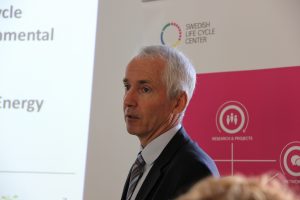PEF seminar gathered more than 30 people
On May 22, 2018, more than 30 people with an interest in the life cycle perspective and product and environmental issues gathered in Gothenburg for an overview of the Product Environmental Footprint (PEF) process in the EU and to find out the latest news including next steps. The seminar was organized by IVL Swedish Environmental Research Institute and Swedish Life Cycle Center, through the project Swedish platform for the life cycle perspective, and it gathered researchers and practitioners working in industry, research institutes, academia and government agencies among others.
PEF is the European Commission’s initiative to calculate products’ environmental performance from a life cycle perspective. Since 2013, a pilot phase has been conducted in which the methodology has been tested on approximately 25 different product groups and in April this year the final conference of the pilot phase was held in Brussels.
“We have done LCA since the 80’ies, but the PEF/OEF activity is unique and more detailed than before. Many large companies are involved”, Elin Eriksson at IVL said during her presentation.

At the seminar in Gothenburg, examples and results from the battery and paper pilots were given as well as reflections and recommendations regarding challenges and opportunities. The two pilots differ a lot. In the case of batteries, a large amount of various parts, battery types and data were studied and Claude Chanson, RECHARGE, presented these at the seminar.
“In the pilot for batteries, we recognized the complexity of the product group. When looking at every aspect of a product one need to gather a lot of data, which in many cases does not exist today. Consequently, a lot of estimations had to be the base in the pilot.”
When Ellen Riise, from Essity and part of the paper pilot, presented their work it became clear that the paper product group doesn’t face the same kind of difficulties.
“The value chain of paper is quite simple”, Ellen Riise said. “When investigating your life cycle, you need to look at the three aspects: What methodology should you use? What are your assumptions? What data is available? Then go back to your business, do your homework and be prepared for the policies that PEF will end up in.”
Elin Eriksson, IVL and the Swedish EU representative in the Technical Advisory Board, explained the process of the PEF/OEF. Now that the pilot phase is over, a transition phase has been established to determine how the methods can be implemented and policies developed as well as how they can be used in a business perspective. There will also be a call for new pilots opening in September 2018. It is expected that by October 2018 a number of product groups will be approved for policy development (whereas a fewer number have not been approved). At the earliest, decision about new policies can be expected in 2022.
The expert group established by the Swedish Life Cycle Center for environmental footprint methodology will continue following the development and give input to the Swedish representatives in the EU.
Contact us if you are interested in joining this work
Text: Ulrika Georgsson
Photo: Helena Larsson and Ulrik Georgsson


